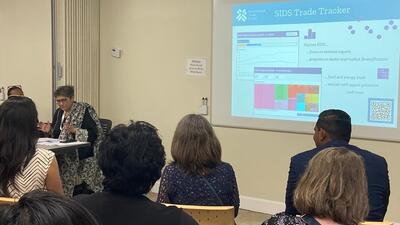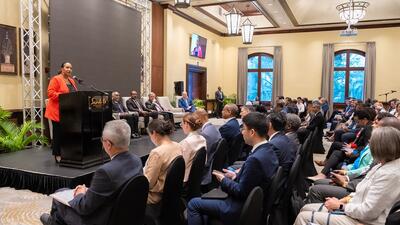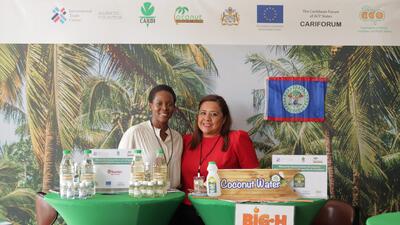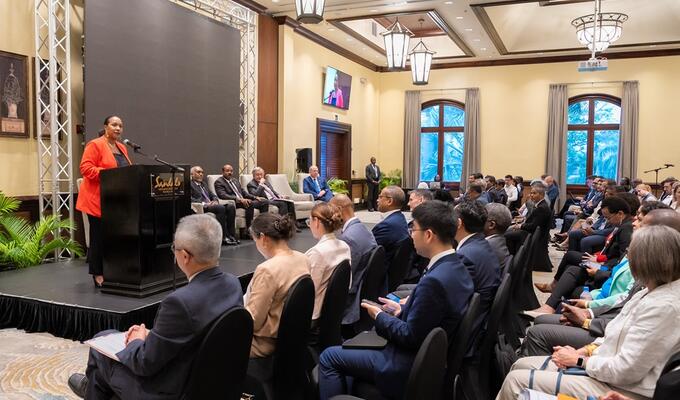
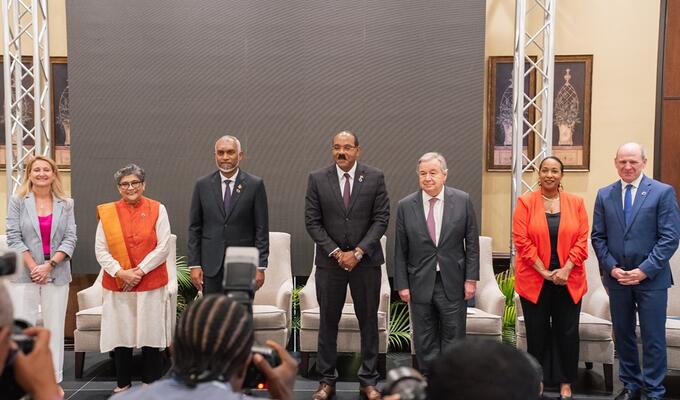
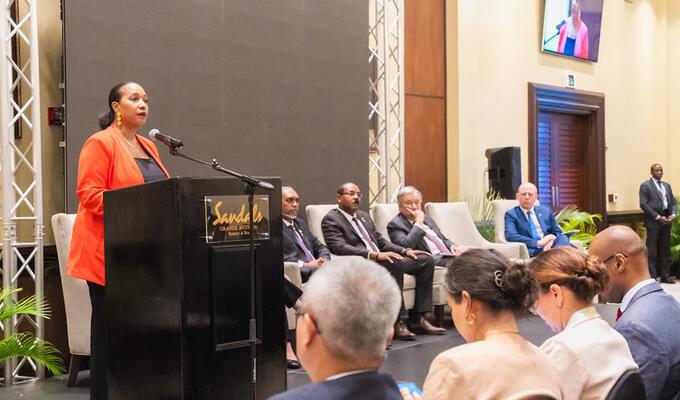
Empowering SIDS Small Businesses for Resilient Prosperity
(Saint John’s, Antigua and Barbuda) ITC Executive Director Pamela Coke-Hamilton delivered her closing remarks at the SIDS4 Global Business Network Forum.
H.E. António Guterres, Secretary-General of the United Nations; H.E. Rabab Fatima, High Representative, Office of the High Representative for the Least Developed Countries, Landlocked Developing Countries and Small Island Developing States; H.E. Gaston Browne, Prime Minister of Antigua and Barbuda; H.E. Mohamed Muizzu, President of Maldives; H.E. Fergal Mythen, Permanent Representative of Ireland to the United Nations and Co-Chair of the Steering Committee on Partnerships for SIDS; Ms. Céline Gerson, President and Group Director Americas, Fugro; excellencies, distinguished guests, ladies and gentlemen.
I want to thank the organizers for making this SIDS Global Business Network Forum possible. This event matters, because it brings to the fore a conversation that should be taking place in every venue where SIDS are being discussed.
The outcomes agreed at SIDS4 will only deliver on the goal of resilient prosperity if we work to support the drivers of that resilience: SIDS small businesses.
They’re the ones driving the solutions to many of the world’s economic, social, and environmental problems. They’re the ones who know what it’s like to balance the need to build a profitable business with the need to limit environmental harm. They’re the ones who are the pride and promise of SIDS economies. And they’re the ones at risk if we don’t do our part.
In other words, if we’re going to deliver on the 2030 Agenda for Sustainable Development, not to mention the Antigua and Barbuda Agenda for SIDS, we cannot afford to have the voice of the private sector be in the background. It can and must be at the forefront.
That’s why ITC has brought some of these MSMEs to SIDS4 so they can share their stories with policymakers directly.
Like a woman named Sophia Searles, who helms an agro-processing company in St. Vincent and the Grenadines, and who has overcome gender barriers, natural disasters, and a global pandemic, all while growing her business.
That’s one of many stories of what resilient prosperity looks like in practice. And it’s a reminder of what’s at stake if we fail to match Sophia’s ambitions, and Sophia’s resolve, with our own.
For 60 years, ITC has been strengthening the competitiveness of micro, small, and medium-sized enterprises around the world. In SIDS, we work directly with SIDS policymakers, helping them craft national export strategies so SMEs can thrive and thus enable trade-led development.
We also work daily with business support organizations, from chambers to trade promotion organizations, to enable an ecosystem that fulfills small business needs. But more needs to be done. SIDS4 gives us the opportunity, as the international community, to focus not only on the challenges but also on the solutions.
One of the biggest challenges we’ve seen, based on our work, is that there just isn’t enough data, including on key trade and market access developments and trends.
Not only does that mean that policymakers are making decisions based on incomplete or outdated information—making it harder to attract investments, increase trade, and access affordable finance—but small businesses, like Sophia’s, are often unable to identify key export opportunities and risks, and optimize their supply chains accordingly.
We’d like to congratulate Antigua and Barbuda for spearheading the creation of the Centre of Excellence and its Global Data Hub, which is a critical step and solution for addressing this problem over the next 10 years.
ITC stands ready to work alongside you and support these efforts, including through our new SIDS Trade Tracker and existing tools like our CARIFORUM-focused Export Potential Map, and through our new guide for business support organizations, which includes advice on how to collect data on climate-related risks that agri-food SMEs face.
We encourage others to do the same, and to partner so that we can scale up to close the data gap. And not just the data gap, but also those in the areas of finance and in the enabling policy environment, as we’ve heard discussed over the past two days. If we want to chart a path to resilient prosperity, I suggest we focus on small businesses first.
As someone who has spent my professional life working on behalf of SIDS’ small businesses, we have to make SIDS4 count for them.
We must do everything in our power to ensure the ambitions expressed this week in Antigua and Barbuda are matched with concrete, measurable actions that deliver for all – including small businesses.
We cannot afford to be having these same conversations ten years from now at SIDS5. By then, it’ll be too late to turn the tide in favour of SIDS and all they have to offer. By then, the biggest threats we face now, particularly climate change, won’t just be threats: they’ll be harsh, unrelenting realities. By then, resilient prosperity may lie permanently out of reach.
We can do better, and I believe, based on what I’ve heard today, that we will.
Thank you all, and congratulations once more to the organizers for making this SIDS Global Business Network Forum such a successful event.




